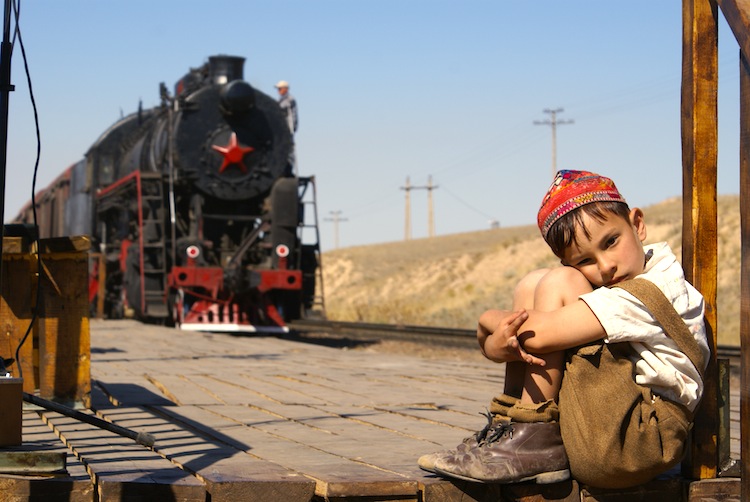By Joe Bendel. One of the scarier aspects of Stalin’s reign of terror was the effectiveness of his cult of personality. His image was omnipresent, investing his iron-fisted rule with a secular idolatry which brooked no criticism. In fact, reverence for the dictator was so deeply ingrained in the Soviet people, many of those who suffered personal persecution under his regime reportedly still wept when news of Stalin’s death was released to the public. That emotional dichotomy is sensitively dramatized in Rustem Abdrashev’s The Gift to Stalin, which finally opens theatrically in New York after an extended festival run.
Under Stalinism, Kazakhstan became the dumping ground for massive deportations of Soviet ethnic minorities (including a surprisingly large Korean community). As Gift opens in 1949, young Sashka’s Jewish family is on one such cramped transport making its way through the Eurasian steppe, in a scene that bears an obvious similarity to tragic events from Europe’s recent anti-Semitic history. The train stops at each provincial station just long enough to unload the freshly deceased, but it is sufficient time for Sashka’s family to smuggle him off the train in the company of corpses, where he is discovered and essentially adopted by Kasym, a fierce looking but gentle track worker.
Given the risks inherent in sheltering Sashka, the Muslim Kasym has the village spiritualist rename him something less suspicious and more Kazakh sounding: Sabyr, meaning humble. Though still physically powerful, Kasym is old enough to be the boy’s grandfather, so he accepts the welcome help of his neighbor Verka, the exiled widow of an alleged traitor. Unfortunately, the village cannot openly come together to raise Sashka/Sabyr. Even on the lonely steppe, the Party apparatus, represented by a venal policeman and the sadistic regional military commander, maintain the Stalinist atmosphere of fear.
When not victimizing the local women, the party leaders are preparing the town’s commemoration of Stalin’s big seven-oh. Gifts from children across the USSR are being collected for the nationwide birthday celebration. The child offering the best sacrifice wins the privilege of giving their offering to Stalin personally. It might sound like a questionable honor, but Sashka covets it as an opportunity to petition Stalin for the release of his parents. However, the gift Stalin really wanted was the first successful Soviet test of an atomic bomb, which will soon literally rocks Kazkhstan.
Abdrashev dramatically employs the vastness of the steppe to express the alienation of his exiled characters and deftly handles his many young actors. The physically imposing Nurjuman Ikhtimbayev turns in a legitimately touching performance as Kasym, the gentle giant. Likewise, Dalen Shintemirov comes across quite naturally on-screen, never cloying nor affected in the role of young Sashka.
Told in flashbacks by an adult Sashka now safely residing in Israel, Gift is an unabashedly sentimental story of sacrifice and thanksgiving, but honestly earns its emotional pay-off. To its credit, the film does not whitewash the realities of life under Stalinism, particularly regarding ethnic minorities banished to the Eurasian republics. One of the best films to play both the New York Jewish Film Festival and Russian Film Week in recent years, Gift well deserves its long deferred theatrical run. Recommended with enthusiasm and affection, it opens today (3/18) at the Cinema Village.

Over-identifying with your captor the way that persecuted Soviet citizens over-identified with Stalin can best be called “Stockholm syndrome.” Unfortunately, I see too much of the cult of personality here in the US with some of our better-known media personalities, who seem to think that they’re above the truth. No matter what they do, their hordes of fanatical followers will justify it.
I like the concept of the film, but that trailer needs some work.
I love discovering new indie films, the problem is most of them don’t come to where I live, and then they’re never on Netflix, and most of them never make it onto DVD. I would like to see this – but how? I thought the internet and DVDs were going to make a lot more films available to everyone, so why are indie film companies so far behind? Why do most of these films never make it onto DVD, when actually DVDs are pretty cheap to produce? If they can’t afford that, why not use Amazon’s on-demand Create Space DVD service so that people interested in a film can at least see it?
An excellent movie about the horrors of Communism and the Stalin Cult, but unfortunately two generations of Americans have little or no personal knowledge of the decades of the Cold War when America and her allies saved the Free World from the ultimate tyranny….Although it does appear that Obama and company are doing a Communist rerun in the USA. I wonder if we get the Obama Cult? Wait, we have that already complete with school children singing to Dear Leader.